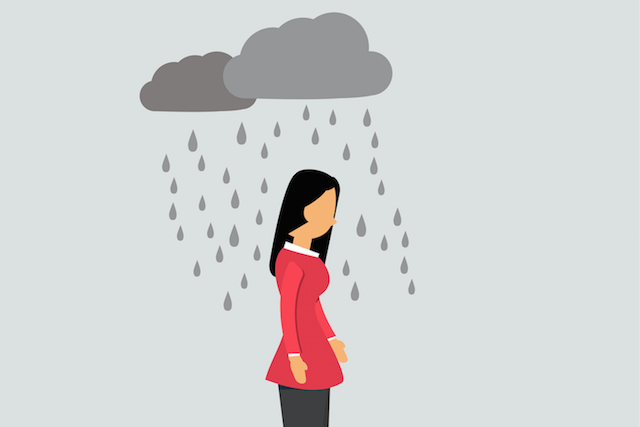
“Forget the failures. Keep the lessons.” ~Dalai Lama
The year had finally come. I’d officially entered the “adult” world after celebrating my thirtieth birthday.
I’d enjoyed being in my twenties. It was an incredible time for self-growth and healing after growing up in an unstable environment with a narcissistic, alcoholic father, and also a time of living life fully, having fun, and going on adventures.
I felt pretty happy…until I hit thirty.
I began examining my life not so positively anymore.
Health problems had become more frequent and scary, my career path was ominous, I had not settled into a place where I wanted to live, and the answer to the big question for women my age (“Are you married with kids?”) was a definite “no.” I felt like I had nothing to show for myself.
So, I resorted to one companion that I had known for a long time: the negativity blanket.
We all have our times with the negativity blanket. It’s not soft, warm, or big, but it’s so familiar.
I used the negativity blanket as protection during the times when I had no safe haven, when I had no comfort, no one to hug me and tell me it was all going to be okay. In a way, it helped me cope with the difficult aspects of my life.
In my twenties I’d learned how to let go of that blanket. I’d learned about discarding old habits that were no longer serving me, accepting situations, fostering a positive mindset, and trying to find solutions to problems without allowing negativity to hold me back.
The time had come to get back to that mentality—but I had to do it without shaming myself for my natural feelings.
It’s easy to feel guilty about not being positive all the time, but we’re only human. It’s okay to have low times, so long as we don’t let them consume us.
Below are some ways to gently move from a place of persistent negativity to more positivity.
Go through what you have to go through.
We all experience difficult emotions. Own them. If we do not own our emotions, we feel shame for having them and it’s harder to see the issue in front of us clearly. It may even become suppressed or internalized.
I felt a string of mixed emotions before I turned thirty. Mostly, I felt lost and insecure because of where I was in life in comparison to a large majority of my peers. These were totally natural emotions.
By letting myself feel them, I was eventually able to move beyond them. As they say, the only way out is through.
Realize your triggers.
It’s always easier to deal with something if you know what you are dealing with. Breaking down a problem and identifying your fears, unknowns, and stressors gives more clarity into what you can change, face, or let go, as well as what challenges you might have in front of you.
For example, my triggers were fears related to being financially stable and cared for, as well as having someone to care for in the future. Realizing what was bothering me helped guide me through finding solutions, such as re-directing my life goals and working on being patient.
Find space.
Begin to create space between you and issues. Creating space means that you are taking a step back from your emotions and taking a look at what you’re experiencing a little more objectively.
I began to work on shedding the shame I was feeling as a result of the narrative that I was telling myself, that I had no accomplishments when I turned thirty. Instead, I found space in between my feelings by relinquishing control over them. I stopped trying to control my future by planning or worrying, and instead focused on my hopes and intentions.
Be grateful.
Gratitude is a powerful tool. It’s the first step to setting a good mindset. You don’t have to be grateful for anything related to your problem; it helps just to identify three things you’re grateful for each day.
I became aware of more value in the life I was living and began cultivating gratitude toward that. I was grateful for the opportunity to move to a different state, for my friends back home and in my new one, and for having the privilege to work as an ecological restoration technician on some of the most beautiful natural areas, I would argue, on this planet.
Reminding yourself to be grateful allows you to see some richness in your life, regardless of what you’re going through.
Take the good with the bad.
It’s not that bad things don’t happen to good people, but the way we handle our issues depends on our perspective. A feeling of personal empowerment emerges when you are able to accept the bad and enjoy the good in each situation.
Even though I had not spent my former years settling down, when I look back I see that I traveled to different countries and states, worked an array of cool jobs in the natural resources industry, got involved in various hobbies and activities that I never thought I could even do, and so much more.
Watch for opportunities.
During this hard time, I began to find opportunities to better myself. I started fine tuning my skills in the various activities I pursued and refined my habits into more appropriate and healthy ones. I realized that I had an opportunity to grow into a better person, and in a better direction than ever before.
It may just take time and patience to realize what may come out of a situation; after all, to quote Joni Mitchell, “Something’s lost, yet something is gained in living every day.”
Build strength.
Call on your courage and see how this can make you stronger.
I was having a terrible time traveling solo internationally at one point in my life and was reciting my woes to a hostel roommate of mine, who happened to have more bad luck than I did. Her perspective was “Sometimes the more you go through, the more you know you are able to handle.” Believe that.
Focus on the lesson.
If you look at past issues, are there any lessons that were learned? Did you get through them and did you feel good about that? That may be one silver lining.
During this time, I was again reminded of how my perspective influences how I work through issues and how much I enjoy life. That negativity blanket was not as useful in the big picture of things.
It’s not possible or healthy to be positive PollyAnna all day. Tragic events, trauma, and drama happen, and we have to go through anything that life hands us. When I felt bad for feeling bad, I reminded myself to stop being so hard on myself. This allowed me to accept my challenges and to recognize the beauty in my life.
It’s the little things we do to motivate and encourage ourselves that bring positivity to our inner world.
Accept all the emotions that arise, and don’t feel bad about feeling bad. Instead, gently pull yourself out of it, just as you’d offer compassion and support to a friend. With your own motivation and encouragement, you’ll feel much stronger overall, and a lot more positive.
About Anna Puchalski
Anna enjoys spending her time in nature from engaging in outdoor sports to various forms of recreation and works in the landscaping field. She desires to live from a place of her true self, striving for happiness and harmony with everyone and everything every day.













 Though I run this site, it is not mine. It's ours. It's not about me. It's about us. Your stories and your wisdom are just as meaningful as mine.
Though I run this site, it is not mine. It's ours. It's not about me. It's about us. Your stories and your wisdom are just as meaningful as mine.